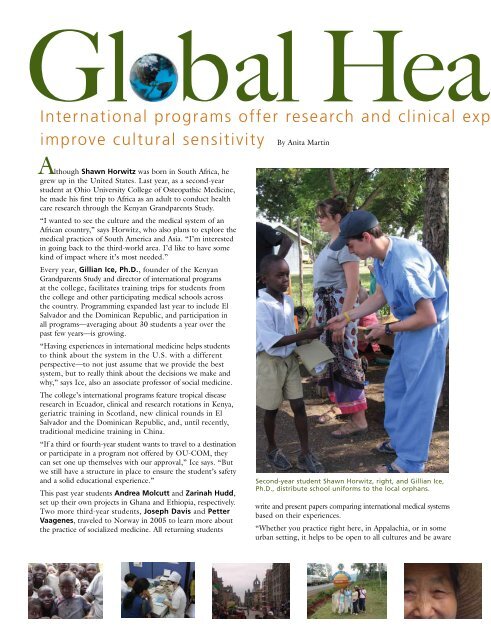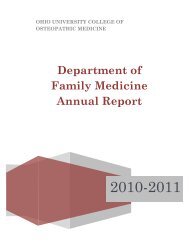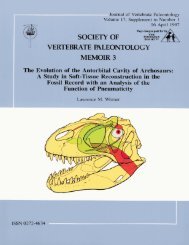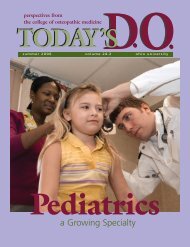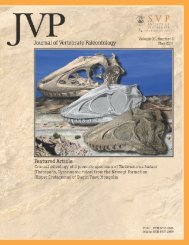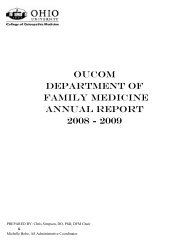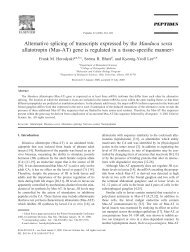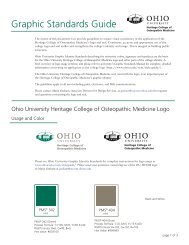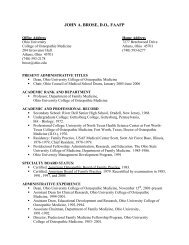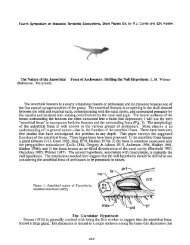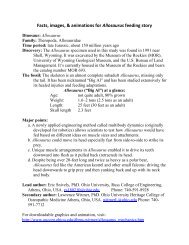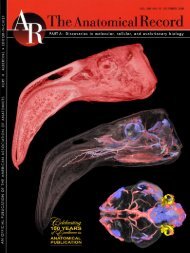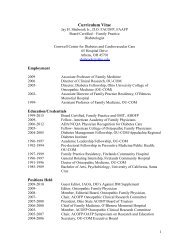DO - Ohio University College of Osteopathic Medicine
DO - Ohio University College of Osteopathic Medicine
DO - Ohio University College of Osteopathic Medicine
You also want an ePaper? Increase the reach of your titles
YUMPU automatically turns print PDFs into web optimized ePapers that Google loves.
Gl bal Hea<br />
International programs <strong>of</strong>fer research and clinical exp<br />
improve cultural sensitivity By Anita Martin<br />
A<br />
lthough Shawn Horwitz was born in South Africa, he<br />
grew up in the United States. Last year, as a second-year<br />
student at <strong>Ohio</strong> <strong>University</strong> <strong>College</strong> <strong>of</strong> <strong>Osteopathic</strong> <strong>Medicine</strong>,<br />
he made his first trip to Africa as an adult to conduct health<br />
care research through the Kenyan Grandparents Study.<br />
“I wanted to see the culture and the medical system <strong>of</strong> an<br />
African country,” says Horwitz, who also plans to explore the<br />
medical practices <strong>of</strong> South America and Asia. “I’m interested<br />
in going back to the third-world area. I’d like to have some<br />
kind <strong>of</strong> impact where it’s most needed.”<br />
Every year, Gillian Ice, Ph.D., founder <strong>of</strong> the Kenyan<br />
Grandparents Study and director <strong>of</strong> international programs<br />
at the college, facilitates training trips for students from<br />
the college and other participating medical schools across<br />
the country. Programming expanded last year to include El<br />
Salvador and the Dominican Republic, and participation in<br />
all programs—averaging about 30 students a year over the<br />
past few years—is growing.<br />
“Having experiences in international medicine helps students<br />
to think about the system in the U.S. with a different<br />
perspective—to not just assume that we provide the best<br />
system, but to really think about the decisions we make and<br />
why,” says Ice, also an associate pr<strong>of</strong>essor <strong>of</strong> social medicine.<br />
The college’s international programs feature tropical disease<br />
research in Ecuador, clinical and research rotations in Kenya,<br />
geriatric training in Scotland, new clinical rounds in El<br />
Salvador and the Dominican Republic, and, until recently,<br />
traditional medicine training in China.<br />
“If a third or fourth-year student wants to travel to a destination<br />
or participate in a program not <strong>of</strong>fered by OU-COM, they<br />
can set one up themselves with our approval,” Ice says. “But<br />
we still have a structure in place to ensure the student’s safety<br />
and a solid educational experience.”<br />
This past year students Andrea Molcutt and Zarinah Hudd,<br />
set up their own projects in Ghana and Ethiopia, respectively.<br />
Two more third-year students, Joseph Davis and Petter<br />
Vaagenes, traveled to Norway in 2005 to learn more about<br />
the practice <strong>of</strong> socialized medicine. All returning students<br />
Second-year student Shawn Horwitz, right, and Gillian Ice,<br />
Ph.D., distribute school uniforms to the local orphans.<br />
write and present papers comparing international medical systems<br />
based on their experiences.<br />
“Whether you practice right here, in Appalachia, or in some<br />
urban setting, it helps to be open to all cultures and be aware


